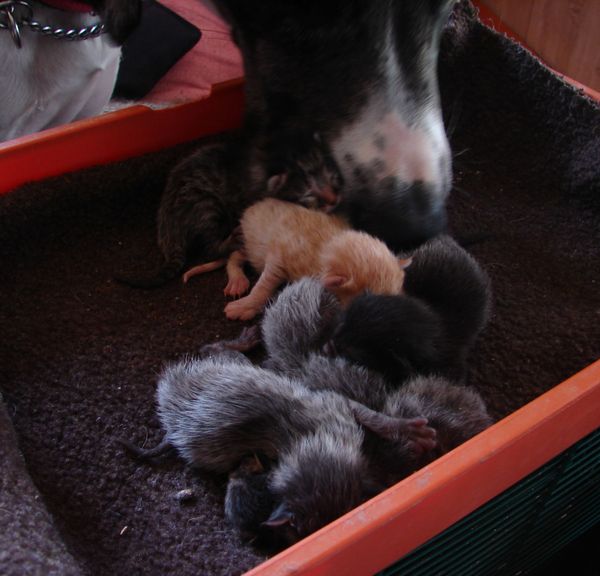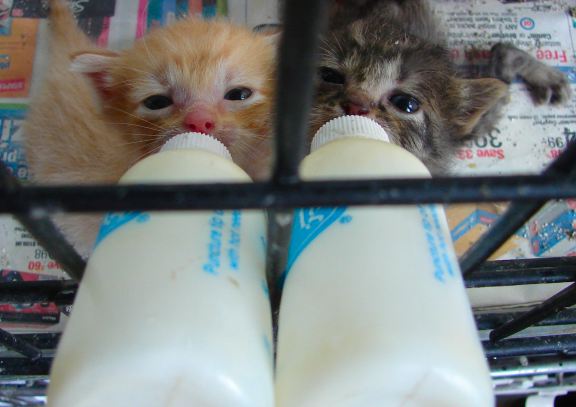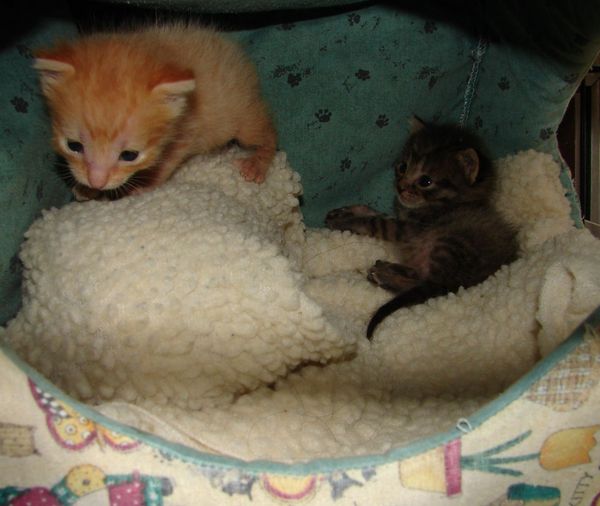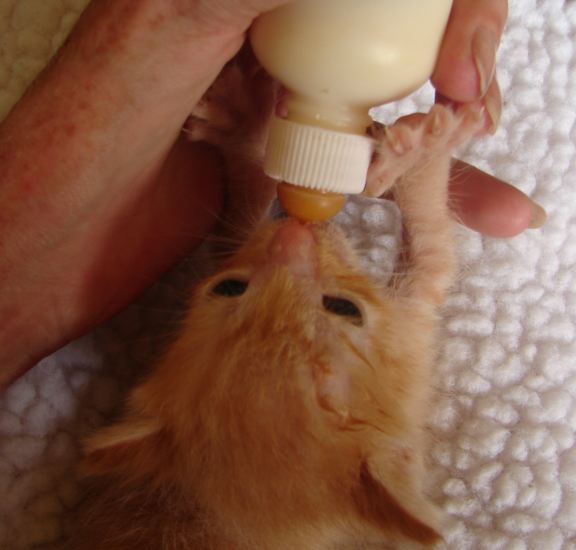» Why does your cat wash your hair or face?
The first thing a kitten experiences, even before it can see, is its mother licking and washing. Grooming is a demonstration of love and caring. So, if your cat occasionally washes your hair or licks your face, he is showing you his acceptance and caring of you as a fellow feline.
» Why does a cat "knead" or "make biscuits"?
When a kitten is nursing, it typically kneads its paws against its mother, either as a sign of contentment or to encourage the milk flow. When the cat matures, it kneads to show its contentment and pleasure.
» Why does a cat go to the visitor who doesn't like cats?
When one cat is threatening another, it stares boldly, sometimes hisses, and frequently moves in toward the other cat. Usually, the person who doesn't like cats avoids looking at it, doesn't talk to it, and sits quietly, hoping to be ignored by the cat. The cat, therefore, sees the person's behavior as "cat-friendly" and practically inviting.
» Why does your cat push its head against you?
This is called "head butts". This is a cat's way of showing affection. Some cats will turn their head, and push it against a human (or another cat).
» Why does a cat do a stiff-legged hop/touch against a human?
That is the cat's body language of saying, "hey, hi there, how ya doin'?"
» Why does your cat rub up against you?
Cats have scent glands along the tail, on each side of their head, on their lips, base of their tail, chin, near their sex organs, and between their front paws. They use these glands to scent mark their territory. When the cat rubs you, he is marking you with his scent, claiming you as "his." Too, he is picking up your scent. Cats rub up against furniture or doorways for the same reason - to mark the item as "his". (Urine spraying is also a territorial marking, by the way.)
» Why does a cat sometimes wash its fur immediately after being petted?
There are two theories on this behavior. One theory proposes that the cat is getting rid of the human smell. The other is that the cat is furthering the pleasure of his association with you by tasting your scent.
» Why do some cats suck wool or clothing?
There are a couple of theories on this:
The cat was weaned too early and the scent of the lanolin reminds the cat of his mother, or The cat has a lack of fiber in his diet.
» Why does a cat walk sloooowly, looking straight forward when passing another cat?
All cats are territorial to an extent - the range of a particular inside cat may extend from a small space in a room to the entire house, depending on their hierarchical ranking in the family. When a "superior" cat confronts on "inferior" in the hierarchy, it will stare at and/or move in for a face-to-face confrontation. When a cat wants to show that it doesn't want to get into an argument, it will make a wide, slow path around the other cat, usually avoiding even looking at it.
» Why does a cat use a litterbox?
In the wild, cats learned to bury their feces to hide their presence from predators or rivals. That trait remains ingrained in our domestic house cats.
» Why does a cat scratch outside the litterbox, instead of inside it?
The cat has probably had several unpleasant experiences of getting his feet soggy or dirty - make sure the litterbox is cleaned out frequently.
» Why does a cat purr?
Usually, a cat purrs because it is content. A mother cat purrs to let her kittens know she is nearby, and kittens purr in response to their mother's grooming. Older kittens purr to entice adults to play. Some adults will purr to show an aggressor that they are non-threatening. Take note, however, that some cats will purr when frightened or in pain. By the way, no one has yet to discover how a cat purrs.
» Why does a cat sometimes scratch the floor as though he is trying to bury his food dish?
It may be a holdover of the wild trait of burying food for later. Or, it may be that he is trying to tell you that the food is not to his liking.
» Why does a cat attack human's ankles?
Kitten play always involves mock battles, with surprise attacks, pounces, and leaps. The kitty is basically trying to play, as he would with another cat. Direct him to less painful game play - chasing balls, cords, and so on.
» Why are some people allergic to cats' fur?
It's not the cat's fur that causes allergies. It's a protein (FEL D1) in the cat's saliva. When a cat grooms itself, it deposits this protein on its fur (and the protein then may be transferred to upholstery and carpets). Some cats have less (or more) of this protein. There is no way to predict which cat in a litter, if any, will be less allergenic, though females seem to be the lesser allergenic. Bathing a cat to reduce the amount of protein in the cat's fur has traditionally been recommended, but research may be tending to negate that conclusion. Instead, wiping down the cat using a damp microfiber cloth to remove visible dander may be more effective. I've also been told that a product called Allerpet, rubbed into the cat's fur, can help reduce the dander.
» Why does your cat turn his/her back on you after a scolding, or if you've been gone for a while?
Typically, a person's body language when reprimanding a pet includes staring or other overtly "aggressive" behavior. The cat usually responds in a submissive fashion. In a sense, it is telling you he has surrendered to you, as a fellow cat, and is discouraging attack. (By the way, you will get better results from a cat if you enforce his positive behavior instead of reprimanding any negative behavior.)
» Why does your cat bring you dead or dying creatures?
There are at least four differing theories on this behavior:
- Your cat is bringing you a present, in appreciation for you feeding it or as a sign of affection.
- Your cat realizes you are a totally incompetent mouser and is trying to educate you.
- The cat is bringing her prey home to where it is safe, where she usually eats.
- The cat is simply trying to make sure you have fresh food.
» Why does a cat play with its prey?
Cats are attracted by movement, so if a stalked prey keeps moving, the cat's desire to attack continues to be stimulated. If the cat gets very excited over the stalking/killing, he may continue to play with the prey after it is dead.
» Why do some cats put their toys in their water or food dish?
Cats look upon their food area as part of their territory, and that particular area of their territory usually doesn't change from day to day - so the cats are likely putting their favorite toys away in a "safe" place. Some cats will consistently put away their toys when they're through playing with them - you might try putting your cat's toys in a small basket near one of his favorite spots and see if he will put them away on his own.
» Why does your cat take a small bite on your arm or cheek and hold on for a few seconds?
Some cats, when they are very happy and feeling extremely affectionate toward the Big Unfurry Cat, will gently take a piece of human skin between their teeth and hold it for a few seconds. Think of it as the feline equivalent of kissing.
» Why do cats roll over on their backs?
Cats roll over on their backs for a variety of reasons: if your cat flops down in front of you and rolls over on his back for a belly skritch, it's a sign of his complete trust in you that you won't ever hurt him. Other times, he wants to play. If the cat is female and in heat, it's a form of foreplay. It's also a part of their social standing. Domesticated cats don't display this as much as wild ones do. Wild cats have a very similar social structure to that of wolves.
» Why does a cat lick photographs or plastic bags?
It has been speculated that they are tasting the slight "odor" that emanates from these products. They may also enjoy the texture of the items on their tongue.
» Why do some cats go crazy over catnip, but others ignore it?
The response to catnip is the result of a gene in the cat; if the cat doesn't have the gene, it cannot physically react to catnip. Some cats will react to catnip by rolling around on the floor in delight, others will just quickly eat it up and wander off, while others will ignore it completely.
» Why does a cat sometimes "sneer" when smelling something?
When a cat curls back its upper lip and looks like it's sneering, it has just discovered an interesting, usually intense odor and is smelling it more deeply. Called "flehming," it is drawing the odors into an organ (Jacobson's organ), in the roof of its mouth.
» Why do cats sometimes scratch at windows?
It may be that they are verifying that there is actually a barrier between them and whatever they see outside.
» Why does a cat hate getting wet?
Actually, many cats enjoy water and at least one breed is known to enjoy fishing and swimming. But, it has to be on their own terms - being picked up by two human hands and dunked in a sink full of water is not on the cat's "own terms."
» Why do some cats insist on drinking from a dripping faucet?
Cats - like most other animals - prefer their food and water fresh, and running water is most appealing for that reason. Too, the motion of water coming out of a faucet is probably appealing to their sense of hearing and sight. Some cats will even put their paw into their water dish and "swirl" it around so they can drinking "running" water.
» Why does a cat hide when it is sick or dying?
Instinct tells a cat to hide where a predator can't find them. When a cat is ill, it may think it is being stalked - so it hides.
» Why does a cat spend so much time grooming?
Besides the obvious purpose of hygiene and the social aspects, grooming helps cats cope with confrontation or embarassment (you may have noticed that if a cat accidentally falls off a chair, the first thing he does is nonchalantly wash himself, as though he intended to get down in the first place.)
» Why does a cat frequently demand attention when you're on the telephone?
The cat, since it can't see the person you are talking to, presumes you are talking to him, and is responding to what he perceives is your conversation with him.
» Why does a cat scratch the furniture or a scratching post?
While some people think a cat scratches to sharpen its claws, that is probably inaccurate. There are typically two reasons for scratching: the cat is marking its territory (cats have sweat glands between their paw pads, and scratching leaves their scent on the clawed object); or, the cat is "filing down" its nails and removing the outer layer.
» Why does a cat suddenly bite or hiss at a person after it's been petted for a while?
If a person persists in touching a sensitive area (such as the cat's tail, ears, or belly), the cat might give a gentle nip to as a way of staying "stop." Too, some cats can tolerate pleasurable stroking only for short periods of time; again, he may communicate "stop it" with a nip or cuff of his paw.
» Why do some cats insist on tipping over their water dish, or take food out of the dish and drop it on the floor to eat?
Most cats do not like to eat or drink out of bowls if the sides touch their whiskers. Also, if a bowl is too deep, the cat may take the food out for convenience. A wider, shallower bowl will probably eliminate this behavior.
» Why does a cat chatter when he sees a bird?
When a cat kills prey, it bites down quickly several times. The "chatter" is simulating the cat's behavior at the time of attack.
Alternatively (according to a visitor): it's pure and simple frustration. When a cat is stalking or killing a bird, they're almost invariably completely silent. It's when they are shut off from the prey that they chatter.
» Why is a cat able to land on its feet from a fall?
When falling, the cat uses its tail to right itself and swivels its body in mid-air, so that it is facing the ground, and lands with its back arched to absorb the shock. Cats have very flexible bodies, so the swiveling is easy for them to do.
» Why do cats like crinkly sounds?
Crinkly sounds are similar to the high-pitched noises of rodents, birds, and crickets, so the crisp, crinkly sound of a crumpled piece of paper or walking into a paper bag stimulates the cat's "prey response."
» Why does a cat swish his tail?
Cats use their tail to communicate their mood.
» Why do cats chew on plants?
It could be that the grass helps the cat get rid of fur swallowed while grooming, or that grass provides fiber or vitamins and minerals not found in meat. Some plants are poisonous to a cat; others are okay for nibbling.
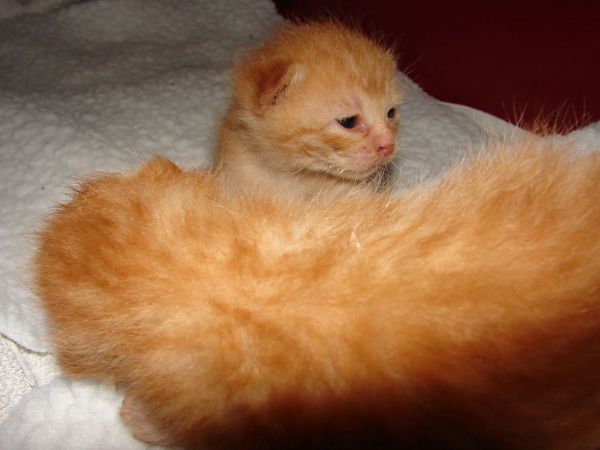

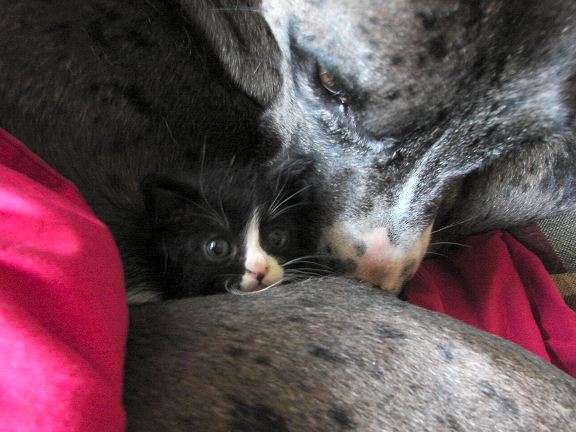

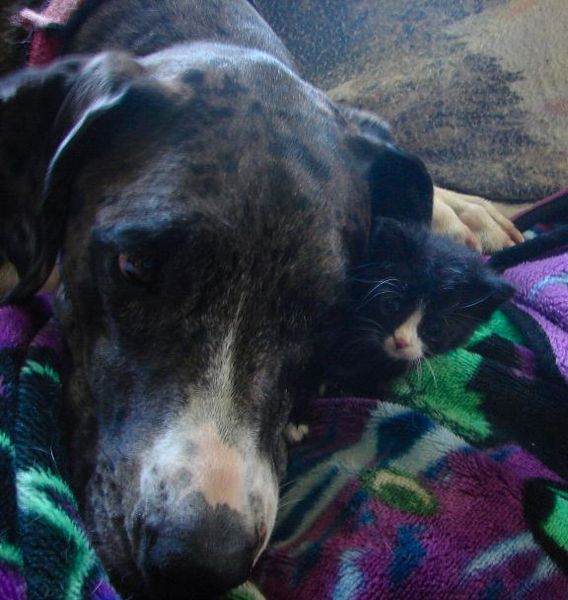
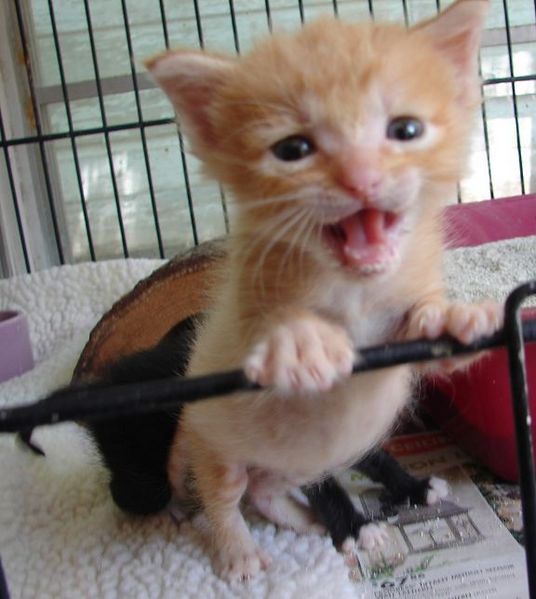
















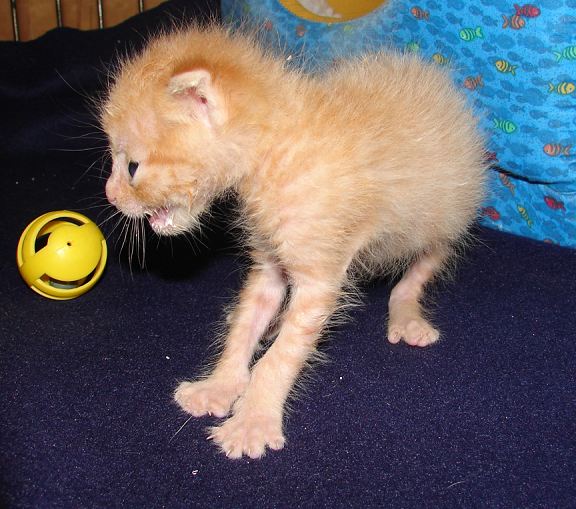
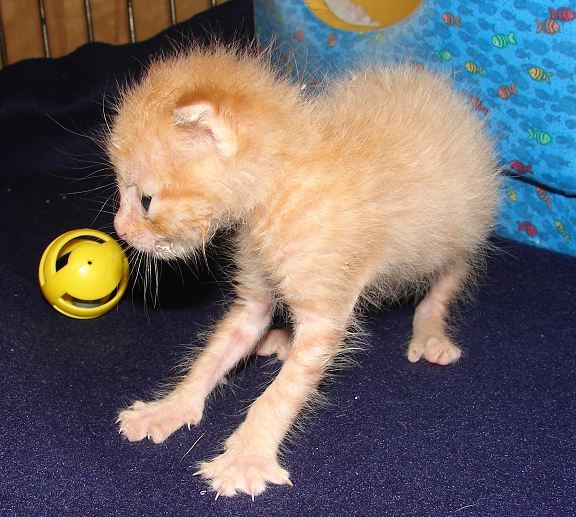
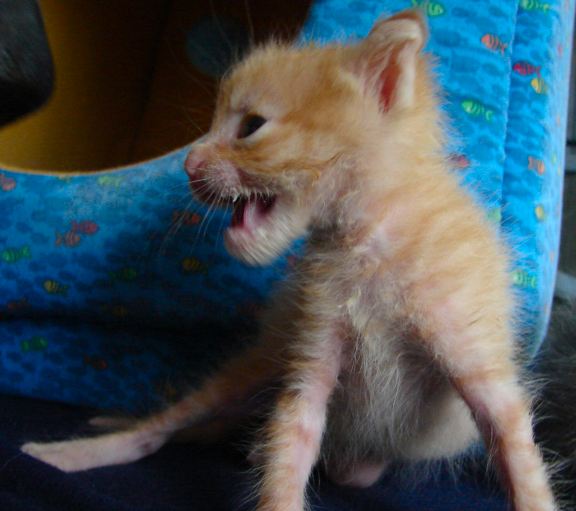
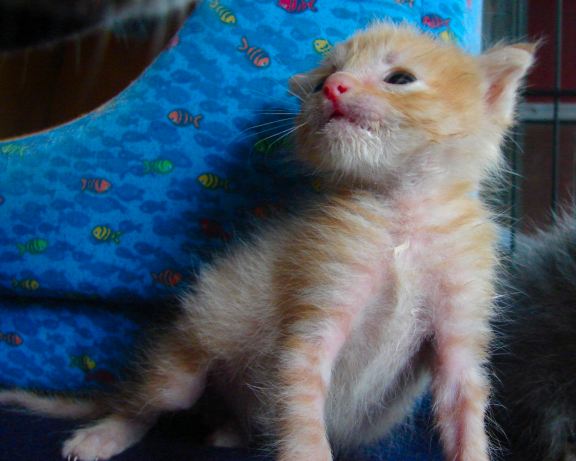 __________________
__________________